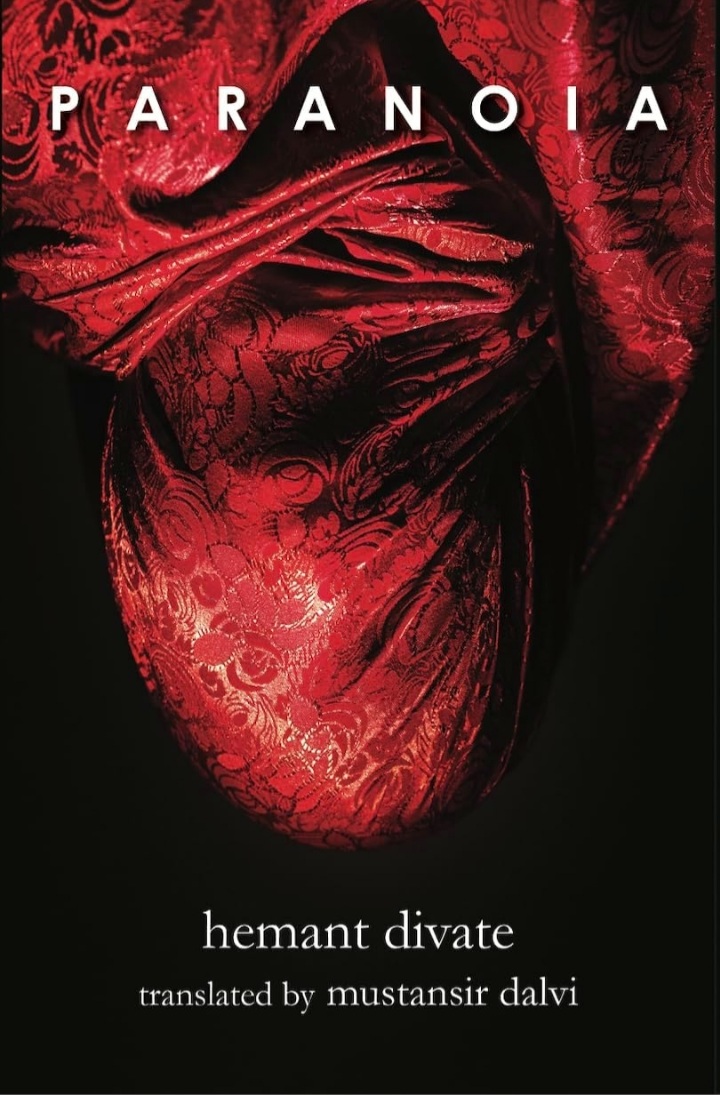A BOOK REVIEW BY SHRESTHA MUKHERJEE
Hemant Divate’s anthology, Paranoia translated into English by Mustansir Dalvi, is a masterful exploration of the intricate corridors of the human psyche. In this collection of poems, the reader is invited to embark on a journey that transcends conventional thought’s boundaries, delving into the shadows where paranoia takes root.
Divate’s poetic prowess is evident from the first stanza to the last. His language is a tapestry of emotions, intricately woven to evoke a visceral response. The original Marathi verses, expertly translated by Dalvi, retain the raw intensity and cultural nuances, providing English readers with an authentic experience.
Each poem in Paranoia is a microcosm of emotions, a symphony of words that resonates with the reader. Divate’s ability to capture the essence of paranoia and translate it into poetic expression is commendable. The verses are not merely words on a page; they are windows into the labyrinth of the mind, inviting readers to explore the intricate maze of human consciousness.
At its core, Paranoia is a thematic exploration of the multifaceted nature of paranoia. Divate weaves a narrative that transcends the conventional understanding of this psychological state. Each poem peels back the layers of the human mind, revealing the vulnerability, fear, and distorted perceptions that accompany paranoia.
The anthology tackles universal themes, making it relatable to readers from diverse backgrounds. Whether grappling with existential uncertainties or navigating the treacherous terrain of personal relationships, “Paranoia” offers a mirror to the human experience. Divate’s ability to articulate these complex emotions with poetic finesse is a testament to his literary prowess. The volume is not merely a collection of poems; it is an odyssey into the depths of the human condition. The poems provoke introspection, prompting readers to confront their fears and anxieties. Divate’s words linger in the mind, inviting contemplation long after closing the book.
Mustansir Dalvi’s translation adds another layer of brilliance to Paranoia. Translating poetry is a delicate art, and Dalvi navigates this task with finesse. The English rendition not only preserves the integrity of Divate’s original work but also infuses it with a new life that resonates with readers unfamiliar with Marathi literature.
Dalvi’s translation captures the cultural nuances and quirks, making Paranoia accessible to a broader audience without diluting its essence. The translated poems maintain the cadence and rhythm of the original, ensuring that the emotional impact remains unaltered. This symbiotic relationship between poet and translator is a testament to the success of Paranoia as a bilingual masterpiece.
On a closer introspection, in the poem “Shall I Tell You a Story?” the poet writes,
“The minute the story starts
The listener must close his eyes”
Here, the poet has spilt the reality of either a brutal present or presentable brutality that this society is denying to allow into their conscience and are subtly turning their heads away and receding into a delusional utopia.
The most abrupt poetic delivery and that too in prose comprises a handful of words to extend the nuances of psychological detrimental for the narrator is delivered through the poem, “Terror,”
“I
Sit
to
write
and
those
at
home
quake
in
terror”
Straddling from the agony to the fear of the human psyche, Paranoia is also an array of personal losses or at least the emotion of experiencing the journey of losses that breaks and frets the human mind into the next possible petite entity of nothingness this universe can pertain to life. In the poem, ‘Father’s instant imminent death…,’ Divate has accounted for a series of flipping emotional upheavals one person can experience overall during the span of someone’s death, who is closely associated with him. In this poem, the poet has journaled the experience the narrator has felt during his father’s gradual health decline. He writes,
“A sick man, weary of life,
and, seeing him live like this,
wearing down slowly,
moment by moment,
we too, were soon sick of it all.”
To conclude, Paranoia is an anthology of the void of a mute spectator, who sees and feels things and situations but somehow ends up choosing to remain indifferent and unkind to changes. The verses are meant to strangle the nothingness travelling inside the veins of a man who is apathetic to this ever-changing impaired world, falling to the fall of its doom.
Also, read Two Flash Fiction Pieces by Rongili Biswas, published in The Antonym:



























0 Comments